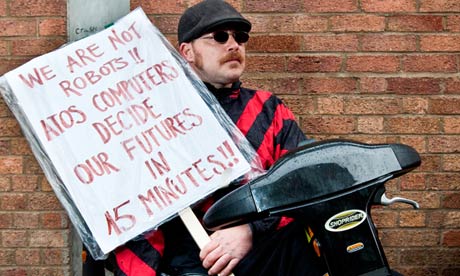
London 2012 organisers have defended the involvement of IT giant Atos in the Paralympics, amid threats of a "day of action" from protesters during the Games.
On the eve of the opening ceremony, organisers said they were on track to deliver the biggest and best Paralympics ever, and defended the involvement of corporate backers in staging them.
Atos is a main sponsor of the Paralympics, providing the technology that underpins the information system that is relied on by officials, athletes and the media. Its name also adorns billboards on the entrance to the Park and the lanyards of the accreditations worn by athletes, the media, volunteers and officials.
But some disability rights activists are angry about its involvement because it also has the £100m government contract to carry out the controversial tests that determine whether claimants of incapacity benefit are "fit to work".
UK Uncut activists have promised a day of action on 31 August, when they will attempt to shut down Atos's central London headquarters.
Tara Flood, who won a Paralympic gold in Barcelona in 1992 before becoming a campaigner and educator, has said: "It is a shocking irony that Atos is a main sponsor of London 2012 whilst destroying disabled people's lives on behalf of the government."
But just as the London Organising Committee of the Olympic and Paralympic Games (Locog) was forced to defend the involvement of contentious sponsors such as Dow ahead of the Olympics, it has stood squarely behind Atos ahead of the Paralympics.
"Atos is an incredibly valuable technology partner. They have been involved for many years now. They provide a portal for the volunteers, they provide a system to manage the information process and the distribution of results. They are a critical and valued member of delivering these Games," said the Locog chief executive, Paul Deighton.
He also defended the involvement of sponsors more widely, saying that without their contribution the Games would not happen in their current form.
"All of our Olympic sponsors are also Paralympic sponsors. It isn't really an issue of having independent Paralympic sponsors. All our sponsors make this Games possible. Our budget of just over £2bn, around £1bn of it comes from cash or services from our sponsors," Deighton said.
"Also, it is the contributions national sponsors make to the national Olympic and Paralympic movement that then fund the support of the team. Without the sponsors, neither Games would be what they are."
Unlike the Olympics, which have a clean venues policy, corporate branding is allowed within Paralympic venues.
Deighton and Peter Hendy, the Transport for London commissioner, urged Londoners to continue to plan their journeys to avoid busy times on the public transport network.
Although there are 2.5m ticket holders at the Paralympics compared with 8.8m at the Olympics, on the busiest days on the Olympic Park there will be a comparable number of people pouring into Stratford.
Hendy said that with children back at school, the summer holidays over and a range of other major sporting and cultural events happening during the 11 days of the Games it was important Londoners continued to use the Get Ahead of the Games website.
The final leg of the torch relay on Wednesday and the marathon on the final day of the Games on 9 September, when a large number of roads will be closed, are expected to be particularly congested.
But Hendy said that the experiences of the Olympics had shown that London's transport system could cope.
"We learned the system has enormous redundancy and that our customers are profoundly sensible. They don't regard small half hour disruptions as the end of the world, they find another way to go," he said.
Deighton said the Paralympics were on course to become the first to sell out to paying ticketholders. Around 2.4m tickets have been sold already, with the remaining 100,000 likely to be made available in blocks of 10,000 throughout the Paralympics. The opening ceremony on Wednesday night has sold out.
The London mayor, Boris Johnson, said he was convinced the feelgood factor that gripped the city and the nation during the Olympics would be maintained through the Paralympics.
"My message to London and the world is that these are going to be a fantastic Games, an amazing festival of exertion and achievement," said Johnson.
"To those who think they have had enough sport already and have reached satiety. As Margaret Thatcher almost once said, when it comes to the Olympics and Paralympics there is no such thing as satiety."
The 277 ParalympicsGB athletes were on Tuesday night officially welcomed into the Paralympic Village, while in Stoke Mandeville the Paralympics torch relay that will conclude in the stadium during the opening ceremony began.
Johnson insisted that investment would continue into making the London Underground network more accessible after the Paralympics. Around a quarter of underground stations have step free access, but the West End is particularly badly served.
"It was the Paralympics and the necessity to get ready for it that gave us the impetus to spend very substantial sums at Green Park, King's Cross and elsewhere. That programme will continue. We can't do everything at once and people will appreciate these are considerable sums of money," said Johnson.
"But as far as we can in tough times we are spending money to make London more accessible. These will be the most accessible Games ever."

